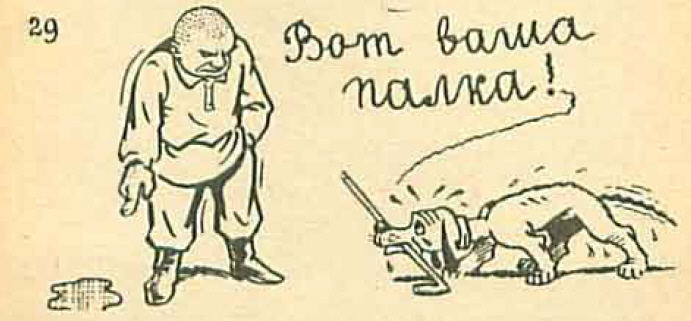
|
Languages |
| Russian for English speakers 29 |
 |
| Lesson 29 |
| 100 |
Russian |
English Английский |
|
84 - восемьдесят четыре |
eighty four |
|
|
85 - восемьдесят пять |
eighty five |
|
|
86 - восемьдесят шесть |
eighty six |
|
|
87 - восемьдесят семь |
eighty seven |
|
|
Двадцать девятый (29-й) урок |
Twenty ninth lesson |
|
|
УРОК НОМЕР ДВАДЦАТЬ ДЕВЯТЬ (№29) |
Lesson number twenty nine (#29) |
|
| Я устал. | I (am) tired | |
| 1 | Носильщик, возьмите багаж ; | Porter, take (my) luggage. |
| 2 | не тот (1) большой сундук .. Этот чемодан. | not that big trunk... this suit-case |
| 3 | Миша, вы забыли зонтик .. и вашу палку (2). | Misha, you forgot (your) umbrella... and your stick. |
|
AK: "палка" means "трость" - walking stick |
||
| 4 | Ах! я устал, Нина, спать хочется (З). | Ah, I (am) tired, Nina, I am sleepy. |
| 5 | Какой вы мужчина (4), Миша;
вы умеете только жаловаться .. |
What (a) man you (are), Misha; you know only to complain : |
|
AK: What kind of man you are, Misha. |
||
| 6 | я не сплю, я плохо спал .. | I do not sleep, I slept badly... |
| 7 |
Я сама не спала (or не спала), и устала, и молчу (5). |
I myself did not sleep, and (I) (am) tired and I keep-silent. |
| 8 | Вот гостиница, и отдых наконец. | Here is the hotel, and rest at last. |
| 9 | Где контора? Ах, вижу .. никого нет (6), конечно .. | Where is the reception-office [counter]? Ah (I) see (it)... nobody of course. |
|
AK : контора
means bureau or office. Here, it means reception desk. |
||
| 10 | Я сажусь; вот звонок; позвоните, пожалуйста. | I sit down; here is a bell; ring, if you please. |
| 11 | Кажется, не звонит. | Seems (to me) (it does) not ring. |
| 12 | Чорт знает, что такое! Эй там! | The devil knows what it is [what like] ! Hey there! |
| 13 |
Кричать не к чему [некчему] (7); нужно терпение. |
Shouting is no use; patience is necessary. |
| AK: There is no need in shouting. Patience is required. | ||
| 14 | Я кричу; вы кричите; он кричит; мы кричим; они кричат; кричать. |
I shout; you shout ; he shouts ; we shout ; they shout; to shout. |
| 15 | Я молчу; вы молчите; он молчит;
мы молчим; они молчат; молчать. |
I keep-silent ; you keep s.; he keeps s.; we keep s.; they keep s. ; to keep silent. |
|
AK : молчать means
to be silent |
|
УПРАЖНЕНИЕ |
EXERCISE. | |
| 1 | Я вас не беспокою? | I don't trouble you? |
| 2 | Эта зажигалка больше не годится. | This (cigarette) lighter is no longer worth (anything). |
|
AK: This lighter is of no use anymore. |
||
| 3 |
В этой коробке ничего нет. |
There is nothing in this box [in this box nothing not]. |
| 4 |
У меня остаётся только одна папироса. |
I have only one cigarette left. [with me remains...]. |
| 5 | Объясните мне, что это значит. | Explain to me what this means. |
| 6 | Я не умею говорить по-русски. |
I do not know (how to) speak Russian. |
| AK : this means: I can't speak Russian. | ||
| 7 | Кто там? - Кажется, никого нет. |
Who (goes) there? - Apparently, (there is) nobody. |
| AK : Who's there? Nobody, it seems. |
||
| 8 | Где вы были вчера?
— Я остался дома. |
Where were you yesterday? - I remained at home. |
|
AK: остался
- "I remained left",
"I stayed" as one-time, completed action |
||
| 9 | Что вам хочется? Мне хочется спать, отдыхать. |
What do you want [to you feels like] ? |
| NOTES |
AK-NOTE |
|
| 1 |
Тот : that..., that one; этот, this..., this one. |
|
| 2 | Вот ваша палка:
here is your stick (nomin.). — Вы забыли вашу палку, you forgot your stick (accusative). |
|
|
3 |
Мне хочется
спать, or мне спать
хочется: I feel like sleeping [to me (it) feels
like sleeping]. |
Мне хочется спать means I want to sleep |
| 4 |
Мужчина (masc., in spite of ending а), a man, in the sense of virile, as opposed to женщина, а woman. |
|
| 5 |
Молчать
: to keep silent. Я молчу
- I'm silent (i.e. I do not speak) ;
молчите!, keep silent!
|
|
| 6 |
The negative form governs the genitive; so никто, nobody, becomes никого (/of nobody/). |
|
|
Не к чему
[неек-чему], it is no use.
|
что - чему |
|
|
Что
:
what is found (disguised) in ничего,
nothing, which is
literally « not of what », genitive. |
Think of не к чему
as one word, |